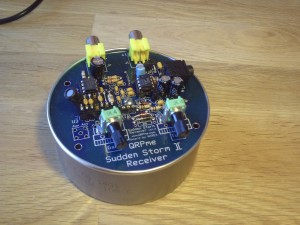The Sudden Storm receiver from QRPme is a simple direct conversion receiver. The circuit is nothing new: A NE602 mixer with crystal oscillator for downconversion and a LM386 as audio amplifier. What is new though is the enclosure.
The parts for the sudden storm kit are being delivered in a tuna can. But the tuna can is not only a nifty enclosure for the parts, it also serves as the base for the fully assembled receiver.
The Sudden Storm receiver kit is available from [1] for just $ 35. The price is more than fair. The kit comes with a professional PCB and all parts to get started on the 40m band. Additional crystals can be purchased from QRPme.
This kit is ideal for beginners and can be build within a few ours. The receiver is fairly sensitive. Even though a fixed frequency crystal oscillator is used, the exact frequency can be adjusted with a potentiometer. The potentiometer acts as a voltage divider and the resulting tuning voltage is applied to a tuning diode in the oscillator circuitry.
Since the price and availability issues for a variable reactance diode (aka tuning diode, Varicap) have been a problem in the DIY community for a while, this kit uses two regular rectifier diodes for this purpose. Any diode changes its capacitance depending on the applied reverse voltage. A higher voltage yields a lower capacitance. This effect is optimized in tuning diodes but sufficiently existent in all rectifying diodes.
If you get bored of listening after a while you can add the Two Tinned Tunas transmitter, also available from QRPme and get started in CW.
Links and Sources:
[1] QRPme: http://qrpme.com/?p=product&id=SS4
Westerhold, S. (2012), "Sudden Storm (HF receiver in a tuna can)". Baltic Lab High Frequency Projects Blog. ISSN (Online): 2751-8140., https://baltic-lab.com/2012/08/sudden-storm-hf-receiver-in-a-tuna-can/, (accessed: July 27, 2024).
Funding:
If you liked this content, please consider contributing. Any help is greatly appreciated.
